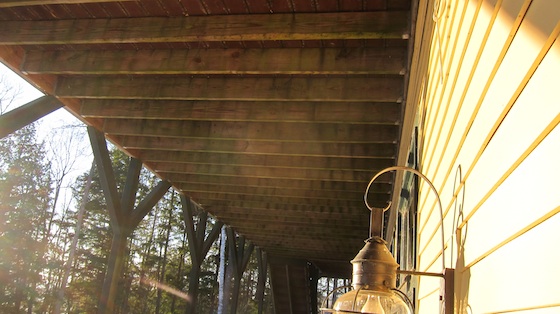Deck Cracking and Pops in Cold Weather
Last night, it was minus 14 F here at my house. I live in central NH and that's not unusual. My large deck started to make very LOUD cracking and pop sounds as the sun began to set yesterday. Others are experiencing this same condition. Read more about it and check out the photo in my February 24, 2015 AsktheBuilder Newsletter.
I can call you on the phone to solve your deck cracking and popping problem. The call is FREE if you're not satisfied with my solution. CLICK HERE to set up the call.
These noises have been happening for the past six years, ever since I purchased this home. I didn't build it.
When I first heard the noise six years ago, it really startled me. It happened in the middle of the night, and I did think the roof was about to collapse as it was snowy and I had yet to discover that you need to rake off roofs in New Hampshire! Yes, I was a flat-lander and still had much to learn about harsh New England weather.
I got out of bed and then another CRACK happened. By then, I was able to trace it to our 60-foot by 10-foot wide outdoor deck.

Here's the underside of my deck. It's hard to see the Trex composite decking, but it's there. Photo credit: Tim Carter
It didn't take me long to figure out what was happening.
The deck is covered with 1-inch-thick pieces of first-generation Trex decking. This material is mostly plastic and includes some wood fibers.
The deck cracking and pop noises happen primarily with decks that have composite or vinyl decking. You can get the sound with wood, but not nearly as much as with composite decking.
Plastic and vinyl decking has an enormous expansion and contraction coefficient. That's a fancy phrase meaning that the size of the material CHANGES as the temperature goes up and down.
This is why the instructions that come with these materials advise you to pay close attention to spacing the material. You need to leave gaps for the expansion and contraction.
Guess what? The IDIOT carpenters that built my deck didn't. The jammed the decking boards up tight against one another.
As the decking gets SMALLER as the temperature drops, the friction and tension between the decking builds up much like that between two moving pieces of the Earth's crust in earthquake zones.
Eventually the stress relieves itself with the CRACK or POP noise. The same thing happens in an earthquake. At some point, the rocks just can't take it and they let loose.
Jeremy Wren is a great remodeling contractor down in Wake Forest, NC. Here's what he sent me. His description about a shotgun is very accurate:
"I had some experience with the loud popping in northern Wisconsin when I was in college. I worked cleaning the library at 6am weekdays, and I was always the first across the wooden bridge. One particular morning was exceptionally cold, about 15 below zero Fahrenheit, and when I stepped on the bridge, I released the pressure between the boards (probably ice heave) and BAM! It was like a shotgun went off. I nearly had a heart attack, but boy was I awake for work then!"
The best way to minimize the horrible noises is to space the material as it says in the written installation instructions.
The bottom line is your deck is not going to collapse from the cold, unless you've got too much snow and ice on it and it wasn't built properly.
Don't allow snow and ice to build up on your deck. READ this column of mine to see how much it weighs per square foot. You'll be stunned.
5 Responses to Deck Cracking and Pops in Cold Weather